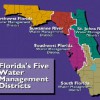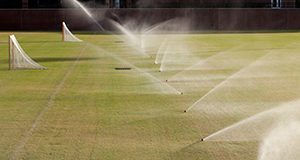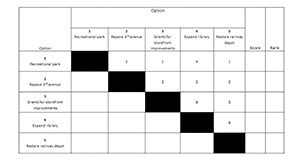The home landscape is a place where there is a great opportunity for people to adopt irrigation practices and technologies that conserve water. However, a large portion of residents lack the required knowledge and skills to adopt some of those practices. This three-page fact sheet discusses using innovative evaluation approaches to demonstrate the impacts of statewide urban water conservation programs. Written by Laura A. Warner, Sebastian Galindo-Gonzalez, and Anil Kumar Chaudhary and published by the Department of Agricultural Education and Communication.
http://edis.ifas.ufl.edu/wc278
Tag: Sebastian Galindo-Gonzalez
Matrix Ranking: A Tool for Decision-Making and Prioritization
Matrix ranking is an activity used to analyze and prioritize information. Extension professionals often work with community groups who may benefit from this type of analysis. This four-page fact sheet explains how Extension professionals can use matrix ranking to facilitate prioritization and decision-making. Written by Keegan Gay, Eric Stubbs, and Sebastian Galindo-Gonzalez and published by the Department of Agricultural Education and Communication.
http://edis.ifas.ufl.edu/wc239
Making Decisions Using Force Field Analysis

Should I adopt water conservation practices? Should I start a community garden? Should I stop using fertilizer on my lawn? These kinds of complex decisions are often difficult because many factors are at play, each with different degrees of importance. Conducting a force field analysis is a simple technique that can help an individual or groups more effectively make decisions and also more holistically consider key factors. Force field analysis allows you to make decisions based on the idea that a point of equilibrium exists within any system. Any proposed change causes a shift in this equilibrium. This four-page fact sheet describes how to conduct a force field analysis, provides a relevant example, and suggests possible applications. Written by Seth Heinert and Sebastian Galindo-Gonzalez, and published by the Agricultural Education and Communication Department.
http://edis.ifas.ufl.edu/wc224
Get SMART: Improve Your Extension Objectives

SMART Objectives assist educators and program planners in developing strong objectives that are Specific, Measurable, Achievable, Relevant and Time-bound. This 3-page fact sheet was written by David C. Diehl and Sebastian Galindo-Gonzalez. Published by the UF Department of Family Youth and Community Sciences, June 2012 and revised September 2015.
http://edis.ifas.ufl.edu/fy1327
Building Impactful Extension Programs by Understanding How People Change
 Extension is reported to be one of the world’s most successful change agencies, and the ability to encourage behavior change remains critical to its success. This 7-page fact sheet describes an approach to understanding how Extension audiences move through the process of change as a means of delivering meaningful programming at the most appropriate level. Written by Laura A. Warner, Sebastian Galindo-Gonzalez, and Michael S. Gutter, and published by the UF Department of Agricultural Education and Communication, December 2014. (Photo:iStock/Thinkstock.com)
Extension is reported to be one of the world’s most successful change agencies, and the ability to encourage behavior change remains critical to its success. This 7-page fact sheet describes an approach to understanding how Extension audiences move through the process of change as a means of delivering meaningful programming at the most appropriate level. Written by Laura A. Warner, Sebastian Galindo-Gonzalez, and Michael S. Gutter, and published by the UF Department of Agricultural Education and Communication, December 2014. (Photo:iStock/Thinkstock.com)
http://edis.ifas.ufl.edu/wc189
Identifying Key Community Leaders to Assess Extension Programming Needs
 Needs and assets assessments are a key task for Extension agents because they aid the development and delivery of research-based programs that address local needs. The purpose of this article is to describe the process of identifying key leaders to support an Extension agent’s needs assessment activities through interviews. This 4-page fact sheet was written by Laura A. (Sanagorski) Warner and Sebastian Galindo-Gonzalez, and published by the UF Department of Agricultural Education and Communication, May 2014.
Needs and assets assessments are a key task for Extension agents because they aid the development and delivery of research-based programs that address local needs. The purpose of this article is to describe the process of identifying key leaders to support an Extension agent’s needs assessment activities through interviews. This 4-page fact sheet was written by Laura A. (Sanagorski) Warner and Sebastian Galindo-Gonzalez, and published by the UF Department of Agricultural Education and Communication, May 2014.
http://edis.ifas.ufl.edu/wc164
Grant Writing: Tips and Advice for New Writers
 While grant writing is a highly useful and potentially lucrative skill, it can also be a challenge to learn how to successfully write grants. Moving through the entire process of creating and harnessing a new idea to building a collaborative team, and making sure the proposal itself is high quality and includes all the important pieces can be daunting for new grant writers. This 5-page fact sheet shares tips and walks you through the process of writing a collaborative grant by helping illuminate how to manage the idea creation, team building, and proposal writing stages of your grant writing experience. Written by Erica Odera, Sebastian Galindo-Gonzalez, Amy Harder, Glenn D. Israel, and Alexa J. Lamm, and published by the UF Department of Agricultural Education and Communication, May 2014.
While grant writing is a highly useful and potentially lucrative skill, it can also be a challenge to learn how to successfully write grants. Moving through the entire process of creating and harnessing a new idea to building a collaborative team, and making sure the proposal itself is high quality and includes all the important pieces can be daunting for new grant writers. This 5-page fact sheet shares tips and walks you through the process of writing a collaborative grant by helping illuminate how to manage the idea creation, team building, and proposal writing stages of your grant writing experience. Written by Erica Odera, Sebastian Galindo-Gonzalez, Amy Harder, Glenn D. Israel, and Alexa J. Lamm, and published by the UF Department of Agricultural Education and Communication, May 2014.
http://edis.ifas.ufl.edu/wc161
Water Issues in Florida: How Extension Can Facilitate Stakeholder Engagement and Involvement
 This 6-page fact sheet is a brief description of recent discussions and policies surrounding water management, use, and quality in Florida. The goal of this publication is to provide brief, but clear, information about the trends in policies that can be used by Extension agents to increase educated conversations about water issues. Water in Florida is a contested issue, and Extension agents may be called upon as a source of unbiased information by the public. Having an understanding of important agricultural and natural resources issues in Florida, including water, can help facilitate conversation, raise awareness, and lead to informed decision making. Written by Erica Odera, Alexa Lamm, Tracy Irani, Hannah Carter, and Sebastian Galindo-Gonzalez, and published by the UF Department of Agricultural Education and Communication, December 2013.
This 6-page fact sheet is a brief description of recent discussions and policies surrounding water management, use, and quality in Florida. The goal of this publication is to provide brief, but clear, information about the trends in policies that can be used by Extension agents to increase educated conversations about water issues. Water in Florida is a contested issue, and Extension agents may be called upon as a source of unbiased information by the public. Having an understanding of important agricultural and natural resources issues in Florida, including water, can help facilitate conversation, raise awareness, and lead to informed decision making. Written by Erica Odera, Alexa Lamm, Tracy Irani, Hannah Carter, and Sebastian Galindo-Gonzalez, and published by the UF Department of Agricultural Education and Communication, December 2013.
http://edis.ifas.ufl.edu/wc151
A Cooperative Agreement and the Implementation of the Endangered Species Act: How Extension Can Facilitate Stakeholder Involvement and Compliance
 This 4-page fact sheet provides a brief description of the Endangered Species Act and updated action pertaining to the endangered species issue. The goal of this publication is to provide brief but clear information about the legislation and current agreements around this issue that Extension agents can use to increase educated conversations. Written by Chandra Bowden, Alexa Lamm, Tracy Irani, and Sebastian Galindo, and published by the UF Department of Agricultural Education and Communication, May 2013.
This 4-page fact sheet provides a brief description of the Endangered Species Act and updated action pertaining to the endangered species issue. The goal of this publication is to provide brief but clear information about the legislation and current agreements around this issue that Extension agents can use to increase educated conversations. Written by Chandra Bowden, Alexa Lamm, Tracy Irani, and Sebastian Galindo, and published by the UF Department of Agricultural Education and Communication, May 2013.
http://edis.ifas.ufl.edu/wc141
Reconciling Immigration and Agricultural Labor Concerns for a Sustainable State Economy (WC132)
 Immigration in Florida is a contested issue, and having an understanding of this issue can help facilitate communication. This 6-page fact sheet provide brief but clear information about the trends in policies that can be used by Extension agents to increase educated conversations around immigration issues. Written by Agricultural Education and Communication, and published by the UF Department of Chandra Bowden, Alexa Lamm, Hannah Carter, Tracy Irani, and Sebastian Galindo, December 2012.
Immigration in Florida is a contested issue, and having an understanding of this issue can help facilitate communication. This 6-page fact sheet provide brief but clear information about the trends in policies that can be used by Extension agents to increase educated conversations around immigration issues. Written by Agricultural Education and Communication, and published by the UF Department of Chandra Bowden, Alexa Lamm, Hannah Carter, Tracy Irani, and Sebastian Galindo, December 2012.
http://edis.ifas.ufl.edu/wc132
Finding Grant Opportunities to Support County Extension Programs (WC134)
 This 3-page fact sheet presents information about where to look for grant opportunities, what to look for when reviewing grant opportunities, and how to determine if the opportunity fits your idea. Written by Amy Harder, Alexa Lamm, and Sebastian Galindo, and published by the UF Department of Agricultural Education and Communication, December 2012.
This 3-page fact sheet presents information about where to look for grant opportunities, what to look for when reviewing grant opportunities, and how to determine if the opportunity fits your idea. Written by Amy Harder, Alexa Lamm, and Sebastian Galindo, and published by the UF Department of Agricultural Education and Communication, December 2012.
http://edis.ifas.ufl.edu/wc134
Get SMART: Improve Your Extension Objectives (FCS6018/FY1327)
 “SMART Objectives” assist educators and program planners in developing strong objectives that are Specific, Measurable, Achievable, Relevant and Time-bound. This 3-page fact sheet was written by David C. Diehl and Sebastian Galindo-Gonzalez, and published by the UF Department of Family Youth and Community Sciences, June 2012.
“SMART Objectives” assist educators and program planners in developing strong objectives that are Specific, Measurable, Achievable, Relevant and Time-bound. This 3-page fact sheet was written by David C. Diehl and Sebastian Galindo-Gonzalez, and published by the UF Department of Family Youth and Community Sciences, June 2012.
http://edis.ifas.ufl.edu/fy1327
Planning or Refining an Extension Program (FCS6017/FY1229)
Whether you are a new or experienced agent, the ability to plan a strong Extension program is critical to your success in Cooperative Extension. This 6-page fact sheet lays out the principles of outcomes-focused planning and provides an overview of the planning cycle. Written by David C. Diehl and Sebastian Galindo-Gonzalez, and published by the UF Department of Family Youth and Community Sciences, May 2011.
http://edis.ifas.ufl.edu/fy1229
WC090 Evaluation Situations, Stakeholders & Strategies
WC090, a 4-page illustrated fact sheet by Glenn Israel, David Diehl, and Sebastian Galindo-Gonzalez, provides guidelines for extension faculty to tailor their evaluation activities to balance their available time and resources with the situation, as well as their individual and stakeholders’ needs. Includes references. Published by the UF Department of Agricultural Education and Communication, November 2009.
http://edis.ifas.ufl.edu/WC090
AEC389/WC070 Extension Program and Customer Satisfaction: Are We Serving All Clients Well?
AEC-389, a 5-page illustrated fact sheet by Sebastian Galindo-Gonzalez, Glenn D. Israel, Marna Weston, and Kathryn A. Israel, explores whether race or gender have an effect on the perceptions of the clientele regarding the quality and outcome of services provided by Extension. Includes references. Published by the UF Department of Agricultural Education and Communication, May 2008.
http://edis.ifas.ufl.edu/WC070
AEC 387/PD036 Using Focus Group Interviews for Planning or Evaluating Extension Programs
AEC-387, a 6-page illustrated fact sheet by Glenn D. Israel and Sebastian Galindo-Gonzalez, provides a brief overview of the focus group interview and suggestions for conducting such interviews. Published by the UF Department of Agricultural Education and Communication, May 2008.
http://edis.ifas.ufl.edu/PD036

